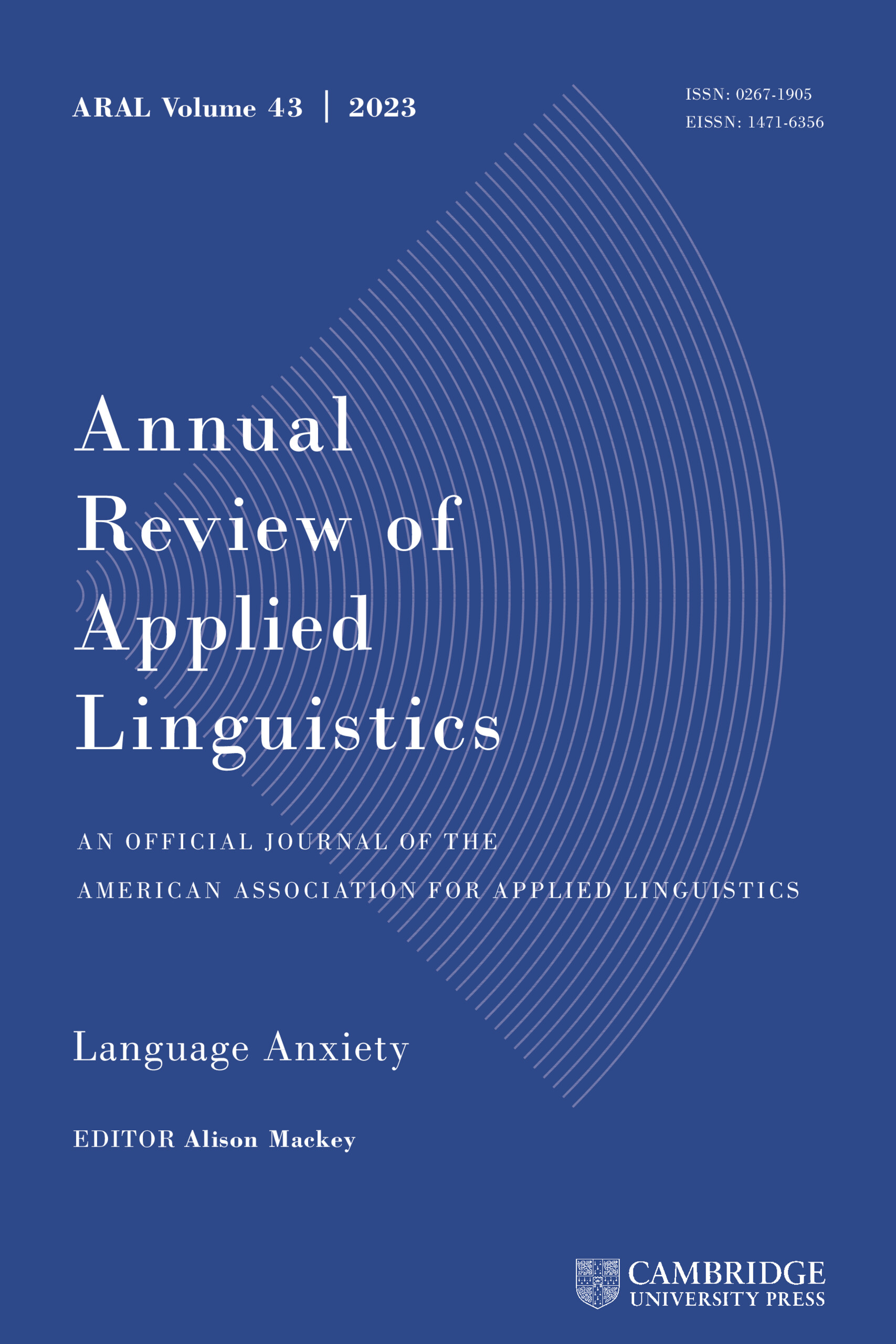Crossref Citations
This article has been cited by the following publications. This list is generated based on data provided by Crossref.
Sabino, Robin
1996.
A peak at death: Assessing continuity and change in an underdocumented language.
Language Variation and Change,
Vol. 8,
Issue. 1,
p.
41.
Bonnesen, Jaye L.
and
Hummert, Mary Lee
2002.
Painful Self-Disclosures of Older Adults in Relation to Aging Stereotypes and Perceived Motivations.
Journal of Language and Social Psychology,
Vol. 21,
Issue. 3,
p.
275.
Marini, Andrea
Boewe, Anke
Caltagirone, Carlo
and
Carlomagno, Sergio
2005.
Age-related Differences in the Production of Textual Descriptions.
Journal of Psycholinguistic Research,
Vol. 34,
Issue. 5,
p.
439.
Moro, Francesca R.
2014.
Resultative constructions in heritage Ambon Malay in the Netherlands.
Linguistics in the Netherlands,
Vol. 31,
Issue. ,
p.
78.
Hinault, Thomas
and
Lemaire, Patrick
2015.
Psychologie et vieillissement.
p.
13.
Hamilton, Heidi E.
and
Hamaguchi, Toshiko
2015.
The Handbook of Discourse Analysis.
p.
705.
LIM, Yong-Suk
2017.
A Study related to the Relation between the Writing of Elderly on Internet and their Complex Tasks.
JOURNAL OF FISHRIES AND MARINE SCIENCES EDUCATION,
Vol. 29,
Issue. 4,
p.
1093.
Di Liberto, Giovanni M.
and
Lalor, Edmund C.
2017.
Indexing cortical entrainment to natural speech at the phonemic level: Methodological considerations for applied research.
Hearing Research,
Vol. 348,
Issue. ,
p.
70.
Mueller, Kimberly D
Koscik, Rebecca L
Clark, Lindsay R
Hermann, Bruce P
Johnson, Sterling C
and
Turkstra, Lyn S
2018.
The Latent Structure and Test–Retest Stability of Connected Language Measures in the Wisconsin Registry for Alzheimer’s Prevention (WRAP).
Archives of Clinical Neuropsychology,
Vol. 33,
Issue. 8,
p.
993.
Pereira, Natalie
Gonçalves, Ana Paula Bresolin
Goulart, Mariana
Tarrasconi, Marina Amarante
Kochhann, Renata
and
Fonseca, Rochele Paz
2019.
Age-related differences in conversational discourse abilities A comparative study.
Dementia & Neuropsychologia,
Vol. 13,
Issue. 1,
p.
53.
Luo, Minxia
Robbins, Megan L.
Martin, Mike
and
Demiray, Burcu
2019.
Real-Life Language Use Across Different Interlocutors: A Naturalistic Observation Study of Adults Varying in Age.
Frontiers in Psychology,
Vol. 10,
Issue. ,
Walters, Keith
2020.
The Cambridge Introduction to Applied Linguistics.
p.
325.
Conrad, Susan
Hartig, Alissa
and
Santelmann, Lynn
2020.
The Cambridge Introduction to Applied Linguistics.
Santelmann, Lynn
2020.
The Cambridge Introduction to Applied Linguistics.
p.
367.
Haitas, Niobe
Amiri, Mahnoush
Wilson, Maximiliano
Joanette, Yves
Steffener, Jason
and
Manelis, Anna
2021.
Age-preserved semantic memory and the CRUNCH effect manifested as differential semantic control networks: An fMRI study.
PLOS ONE,
Vol. 16,
Issue. 6,
p.
e0249948.
Dikker, Suzanne
Mech, Emily N.
Gwilliams, Laura
West, Tessa
Dumas, Guillaume
and
Federmeier, Kara D.
2022.
Cognitive Aging.
Vol. 77,
Issue. ,
p.
29.
van Boxtel, Willem S.
and
Lawyer, Laurel A.
2023.
Syntactic comprehension priming and lexical boost effects in older adults.
Language, Cognition and Neuroscience,
Vol. 38,
Issue. 1,
p.
105.
Haitas, Niobe
Dubuc, Jade
Massé-Leblanc, Camille
Chamberland, Vincent
Amiri, Mahnoush
Glatard, Tristan
Wilson, Maximiliano
Joanette, Yves
Steffener, Jason
and
Mirman, Daniel
2024.
Registered report: Age-preserved semantic memory and the CRUNCH effect manifested as differential semantic control networks: An fMRI study.
PLOS ONE,
Vol. 19,
Issue. 6,
p.
e0289384.


